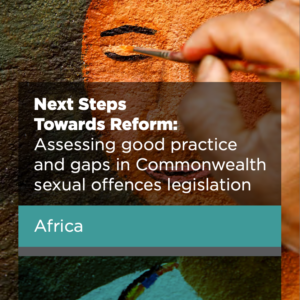Namibia’s sexual offences laws are in the Combating of Rape Act 2000 (CRA), the Combating of Immoral Purposes Act 1980 (IPA) and the Children Care and Protection Act 2015 (CCPA). The Criminal Procedure Act 2004 (CPA) contains the rules relevant to evidence in sexual offences cases. Namibia does not have a penal or criminal code, as the criminal law is uncodified. Some sexual offences are common law offences.
Some of the provisions covered by this review and the criteria below meet good practice standards. For example, the CRA contains a comprehensive gender-neutral definition of rape including all forms of non-consensual sexual penetration – by penis, objects and other body parts – of all orifices. However, coercion is required unless the complainant is incapacitated, which is not good practice. Marital rape is explicitly criminalised. The CPA expressly states that corroboration is not required for any offence and that the prior sexual history of a sexual assault complainant is inadmissible.
However, not all non-consensual physical sexual acts are criminalised. The common law offence of indecent assault is limited to physically touching the genitals or other private parts of another person’s body. Further, there is only one child sexual assault offence in the IPA – ‘carnal knowledge of a child under 16’. The CCPA includes only limited offences related to sexual acts, for example, exploitation of children for the creation of pornography. Child pornography offences are not assessed in this report. The IPA also criminalises sexual intercourse with a woman who has an intellectual disability, regardless of her capacity to freely and voluntarily consent. It also uses the derogatory terms ‘imbecile’ and ‘idiot’. All non-consensual sexual acts should be included in the general sexual assault provisions, such as ‘rape’ and ‘sexual assault’, as well as in child sexual offences. All of these crimes should be gender-neutral.
In Namibia, sodomy and the crime of ‘unnatural sexual offences’, which includes other forms of sexual activity between men, were previously criminal offences under the common law inherited from South African (and formerly British and German) rule. These common law offences were held to be unconstitutional and invalid by a High Court ruling on 21 June 2024, as the Court found they amounted to unfair discrimination in violation of the Nambian Constitution. The common law provisions criminalising consensual same-sex sexual activity between adult men in Namibia are therefore no longer in force. The Namibian government has appealed this decision to the Supreme Court. However, the High Court’s decision will remain in force until the Supreme Court has delivered its ruling.
Namibia is a state party to relevant international and regional human rights treaties, including the Convention on the Elimination of All Forms of Discrimination against Women, Convention on the Rights of the Child, Convention on the Rights of Persons with Disabilities, Convention against Torture and Other Cruel, Inhuman or Degrading Treatment or Punishment and International Covenant on Civil and Political Rights. Namibia is also a party to the African Charter on Human and Peoples’ Rights and the African Charter on Human and Peoples’ Rights on the Rights of Women in Africa (Maputo Protocol).
Read more about the Court decision which decriminalised same-sex intimacy in Namibia.
The full assessment of Namibia is also available here.



